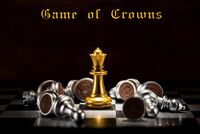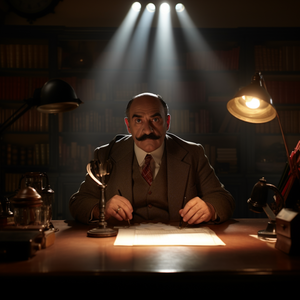Xunpadshahannama: Game of Crowns
| Xunpadshahannama: Game of Crowns | |

| |
| Original title | Xunpadshahannama |
| Language | Common Tongue |
| Author(s) | Gustaaf Vermeylen |
| Genre | Historical narratives |
| Location(s) | Çakaristan |
| (main) characters | |
| Timeframe | 1728 and onwards |
Xunpadshahannama: Game of Crowns is the first part in the story series Xunpadshahannama. This Book of Xunpadshahan is the official chronicle of the reign of Xunpadshahan. It contains various stories surrounding the Shahanshah, the third ruler of Çakaristan.
Starting at the beginning
"Your majesty, you had summoned me," Abu Turbati spoke, taking a bow. "Yes, grand vizier, I have made a proposal to amend the constitution," said Xunpadshahan, handing over a paper. The grand vizier took it and read it. "Your majesty, your father would be proud of you." Xunpadshahan immediately interrupted the grand vizier in a rage, "My father...". Snorting heavily, the Shahanshah searched for words. "My father, was too weak to tackle that Hrithik!" he roared. The grand vizier bowed his head and thought quickly. "Your majesty, you know best. Your proposal reflects your wisdom in denying that opponent the prospect of the throne. But..., your majesty, forgive me. Not the entire house of Çakar is disloyal to you".
Xunpadshahan stood before the grand vizier and poked his finger on his chest: "You take this proposal to the Congress and you make sure it is passed. If not, I will dismiss you as grand vizier." The grand vizier raised his head in amazement: "But your majesty, am I not loyal to you?" "You are, if you do not obey my orders," Xunpadshahan responded. The grand vizier bowed his head and stepped back to leave the room.
•••
The investigation into Jaaguzan's murder was at a standstill. Zahra had scolded the chief detective in charge of the investigation so harshly that the man resigned his post. The grand vizier then appointed Herkül Armut, a detective. Herkül had an unorthodox way of working and had a good reputation for taking difficult investigations to a legitimate outcome. This did not sit well with Zahra at all, as she and Aurangzeb were also questioned by this detective. She insisted that their testimonies were joint and that the detective did not make a report. The detective was upset at this attitude and argued that the interrogation was meant to exclude them. But this did not change Zahra's attitude.
At the Red Fortress in Agra, even the palace staff was not allowed to go near the room, where the interrogation took place. No one else was allowed to know what was said. For three hours, the interrogation lasted. At a later press conference, the detective did not mention the interrogation; the media did not know that the interrogation had taken place.
Only the Red Fortress had secret corridors. Knowing about this, Zahra had chosen a room where she knew there was no secret corridor running along it. In addition, she had had the room checked for any eavesdropping material. Yet the conversations were overheard. Someone was listening to the conversations in the room through a small hole in the wall, behind a painting. From a cleaning room, the hole could be opened.
•••
Several men gathered at a manor house on the island of Rulak. Through different modes of transport, they arrived at different times. In this way, they tried to conceal the meeting from the public. The different men were bank executives. The host of the meeting addressed the men, saying, "You know why you are here. This country has no central bank, no centralised arrangement for money circulation. The currency is gold or silver, so its value is not determined by circulation. In short, no control. As you know, Akbar stopped the creation of a central bank. And even now, the United Green party in the Congress will vote against it. Still, now is the time to make preparations for a central bank." The other men had listened approvingly, until the last sentence. Then unease arose.
"How can it be? There is not enough support in Congress for a central bank" said one of the bankers. Others fell in with him, but after a while the host said, "Gentlemen, I will settle the political side of this matter as long as we are going to act now. If we can come to an agreement to set up a central bank in private hands, our hands, we will finally start bringing this country under control." The bankers were not yet comfortable. But a paper was handed out, on which a proposal for a central bank was written out. Some bankers saw their own names listed as members of the Board of Governors, others as President of a district bank. The mood improved among the bankers. After drinks, the agreement was signed and a toast was made to the future central bank in Çakaristan.
